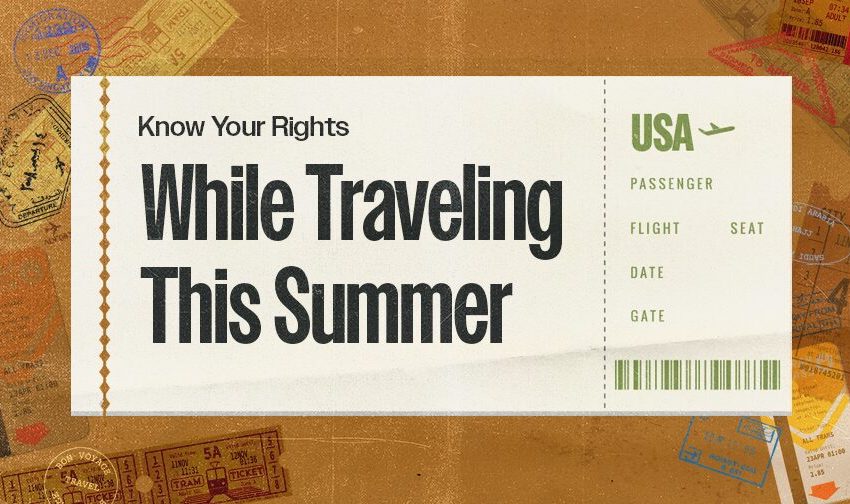Know Your Rights While Traveling This Summer

With summer upon us and July 4 just around the corner, many Muslims are traveling both domestically and internationally. CAIR-SFBA wants to help you stay safe by informing you of your rights as an airline passenger.
Below, we answer some common questions we receive about traveling.
*This serves as a guide and does not constitute legal advice. If you need more direct assistance, please contact CAIR-SFBA’s Civil Rights department.
WHAT ARE MY RIGHTS WITH TSA?
TSA agents are responsible for safety-related screenings and searches related to travel within the U.S.
TSA Can:
- Detain you briefly if they feel you are a security risk or if you are doing a specific illegal activity.
- Ask you to submit to a pat-down.
- Ask you to open your carry-on and search through your belongings.
- Ask you about your citizenship and where you are traveling.
TSA Cannot:
- Ask personal questions without cause about your family, job, politics, or religion if you are a U.S. citizen.
- Target you for more screening based on your race, ethnicity, or religion.
- Handcuff or strip search you without probable cause that you’ve committed or will commit a crime.
- Force you to remove certain items of religious clothing, such as hijab, without a private room.
- Force you to submit to a pat-down from someone of a different gender.
WHAT ARE MY RIGHTS WITH CPB?
U.S. Customs and Border Protection (CBP) agents are responsible for preventing the illegal entry of people or goods.
CBP Can:
- Ask about your citizenship, the purpose of your trip, countries visited, and anything you bring back to the U.S.
- Request valid documentation to verify travelers’ identities.
- Examine your baggage and everything in it.
- Physically take electronic items, but they cannot force you to unlock them.
CBP Cannot:
- Target you for more screening based on your race, ethnicity, or religion.
- Ask personal questions without cause about your family, job, politics, or religion if you are a U.S. citizen.
- Perform a strip search or body cavity search without reasonable suspicion.
- Hold you for prolonged secondary screening without allowing you to have an attorney present.
CAN I BE DENIED ENTRY TO THE U.S. IF I REFUSE A CPB AGENT’S INSTRUCTIONS?
- U.S. citizens cannot be denied entry to the U.S. for refusing to produce passwords, provide device access, submit electronic devices for a search, or for refusing to answer questions unrelated to establishing the person’s citizenship or identity.
- Lawful permanent residents (LPRs) who have previously been admitted to the U.S. and have maintained their status also cannot be denied entry. LPRs only have to answer questions establishing their identity and permanent residency, but refusal to answer will likely cause delay. Do not voluntarily give up your green card or sign anything you do not understand!
- Non-citizen visa holders may be denied entry for refusing to cooperate or answer questions.
DO I HAVE THE RIGHT TO WEAR A HIJAB DURING SECURITY SCREENINGS?
You have the right to wear a hijab or any other religious head covering while traveling and during security screenings. However, if the security alarm goes off, TSA agents may request additional screening where they pat down your hijab or ask you to remove it. If this happens:
- Assert your right to wear hijab or any other religious head covering.
- Request that you pat down your hijab yourself while a TSA agent supervises.
- If refused, have the pat-down or hijab removal be conducted in private by the same gender.
- TSA may also test for chemical residue after the pat-down.
WHAT DO I DO IF MY ELECTRONIC DEVICE IS TAKEN?
You are not required to provide a password to unlock your phone or laptop if asked by a CBP officer. Verbally voicing your objection to any search or seizure of your device is recommended to help preserve any future legal claims. Agents need reasonable suspicion to hold your device for an extended period of time or to do an invasive search of your device. If your device is confiscated, write down the officer’s name and ask for a receipt for your property.
To protect your digital data:
- Encrypt and back up your device’s data to a cloud-based service and erase sensitive data and log-in information from your device.
- Use a strong password and turn off fingerprint or face unlock.
- Shut down your device before arriving at the border checkpoint.
WHAT SHOULD I DO IF I ENCOUNTER ISSUES WHILE TRAVELING?
If you encounter issues while traveling:
- Never provide false information, fake documents, or an incorrect imigration status while traveling.
- Politely object to any question about your community, family, religion, politics, or work by saying “That question is not relevant to my entry into the country.”
- Ask to speak to a supervisor.
- Document the name, agency, badge number, and contact number of anyone you speak to.
- Write down a statement of facts immediately after the incident. Be sure to include the flight number, the flight date, and the name of the airline.
- Do not sign anything before speaking to a lawyer.
- Report the incident to your local CAIR office. Our civil rights team will document the incident and can provide legal assistance if needed.
Always tell someone about your travel plans and provide them with your itinerary. Text your contacts from the airplane to let them know you’ve landed. If you’re delayed by CBP beyond a reasonable amount of time, they should contact an attorney.
If you feel your rights have been violated while traveling, or if you need further assistance, contact CAIR-SFBA’s Civil Rights department at 408.986.9874 or click here to report an incident.


